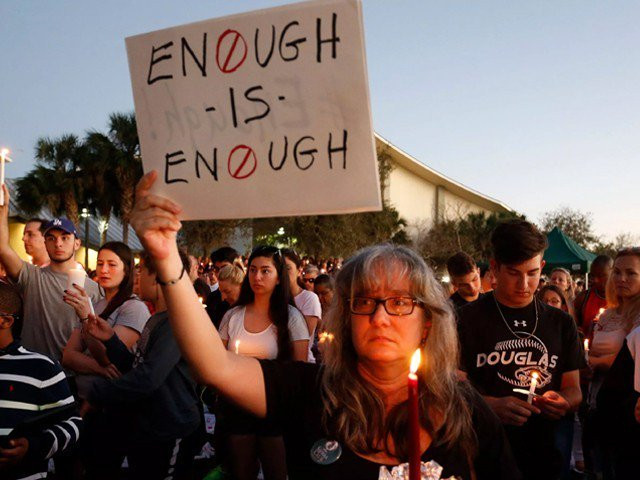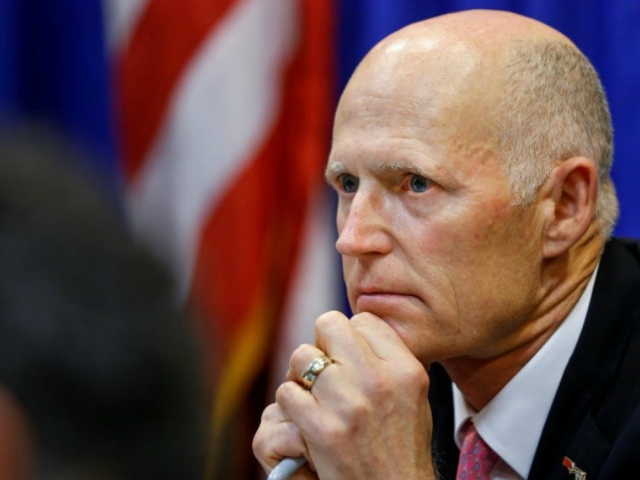Florida governor proposes new gun sale limits after school shooting
Rick Scott wants to change state laws to make it 'virtually impossible for anyone who has mental issues to use a gun'

Scott said he would work with the Republican-controlled legislature over the next two weeks to raise the minimum legal age for buying any gun in Florida from 18 to 21, with some exceptions for younger individuals serving in the military or law enforcement.
That proposal put the Republican governor at odds with the National Rifle Association (NRA), which has opposed higher age limits in Florida, where a person must be at least 21 to buy a handgun but can be as young as 18 to purchase an assault rifle.
But Scott, who has been endorsed by the NRA and received its highest rating for supporting the rights of gun owners, said he opposed an outright ban on assault rifles, as some gun control advocates have demanded.
 Florida Governor Rick Scott listens during a meeting with law enforcement, mental health, and education officials about how to prevent future tragedies in the wake of last week's mass shooting at Marjory Stoneman Douglas High School, at the Capitol in Tallahassee, Florida, U.S. PHOTO: REUTERS
Florida Governor Rick Scott listens during a meeting with law enforcement, mental health, and education officials about how to prevent future tragedies in the wake of last week's mass shooting at Marjory Stoneman Douglas High School, at the Capitol in Tallahassee, Florida, U.S. PHOTO: REUTERSHe also backed adoption of a law, like those enacted in a handful of other states, allowing police and family members to obtain restraining orders to bar people suspected of posing a threat of violence from possessing guns.
Broward County Sheriff Scott Israel, who is leading the investigation of the Feb. 14 shooting rampage at Marjory Stoneman Douglas High School, welcomed Scott’s plan as a “strong first step in giving us the proactive ability to keep Florida safer.”
But critics of the plan, which closely mirrored proposed measures unveiled on Friday by leaders of the state legislature, said it failed to go far enough.
“He is doing the bare minimum,” said US Senator Bill Nelson, a Florida Democrat widely expected to face a re-election challenge this year from Scott.
Chinese paper says US should learn from China, restrict guns, protect rights
Julie Kessel, president of the League of Women Voters of Florida, called Scott’s proposals “very small, incremental changes.”
The 17 people slain in the Fort Lauderdale suburb of Parkland were shot with a semiautomatic AR-15-style assault weapon, which authorities say was purchased legally last year by the accused gunman, Nikolas Cruz, when he was 18 years of age.
Cruz, now 19, a former Stoneman Douglas student who authorities said had a history of run-ins with the law and was expelled from school for disciplinary problems, has been charged with 17 counts of premeditated murder.
The Federal Bureau of Investigation (FBI) and the Broward County Sheriff’s Office have since acknowledged receiving several tips over the past two years from callers saying they had reason to believe Cruz was inclined to commit a school shooting.
In one of those tips, an unidentified caller warned the FBI about the gunman’s possible intentions a month before the shooting, the Wall Street Journal reported.
“He’s going to explode,” the woman, who was close to Cruz, told to a tip line operator on Jan. 5, according to a transcript reviewed by the Journal.
In addition to age limits, Scott said he wanted to change state laws to make it “virtually impossible for anyone who has mental issues to use a gun,” echoing similar calls by US President Donald Trump.
The governor called in particular for a new programme allowing a family member, police officer or community welfare expert to seek a special court order barring the purchase or possession of a firearm by anyone shown to pose a safety threat due to mental illness or violent behaviour.
Scott also urged amending state law so that anyone involuntarily hospitalised as dangerously mentally ill be stripped of all access to firearms, with a court hearing required before their gun rights could be restored.
Renewed focus on background checks
Federal law bars possession of firearms by anyone found by a court or other legal authority to be a danger to themselves or others. Convicted felons, fugitives and people with a record of drug addiction also are banned from owning guns.
But many states have been slow in furnishing mental health records to the FBI database used in flagging prospective buyers who are supposed to be prohibited from owning a weapon.
The governor’s proposals come amid a reignited national debate on gun rights, led in part by some of the student survivors of last week’s massacre, ranked as the second deadliest US public school shooting on record.
Students and parents calling for tougher gun controls traveled earlier this week to meet with politicians in Tallahassee, the state capital, and with Trump at the White House.
Trump has suggested arming teachers as a way of curbing gun violence in schools, as advocated by the NRA. He has also called for raising the legal age for buying rifles nationally to 21, and for beefing up background checks on prospective gun buyers.
US educators say no to 'arms race' in schools
On Capitol Hill on Friday, a group of 18 House Republicans urged House Speaker Paul Ryan to schedule a vote on legislation strengthening background checks.
The legislation already passed the House in December. But it was coupled with a controversial measure aimed at significantly expanding permits for carrying concealed weapons.
The group of House Republicans urged Ryan to bring it to the House floor as a stand-alone bill so that it will have a greater chance of approval by the Senate and enactment into law.
Scott also called for posting law enforcement officers in every public school and for mandatory “active shooter training” for students and faculty.
He spoke as staff members were returning to Stoneman Douglas for the first time since the massacre.
“Everything was quiet, and looked like it was frozen in time,” social studies teacher Greg Pittman said.
Amnesty slams Trump-led 'politics of hate' worldwide
Outside the school, some teachers gazed at flowers and makeshift memorials. One woman who brought balloons to add to the displays fell to her knees in tears.
Classes are due to resume next Wednesday, but the building where most of the bloodshed occurred will remain closed.
Speaking to reporters on Friday, Trump criticized the armed sheriff’s deputy assigned to the school for doing a “poor job.” The deputy, Scot Peterson, resigned after an internal investigation found he failed to go inside and confront the shooter, the Broward sheriff said on Thursday.



















COMMENTS
Comments are moderated and generally will be posted if they are on-topic and not abusive.
For more information, please see our Comments FAQ